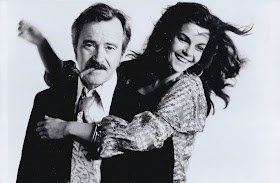
"Big Bang Theory" - the polar opposite of mediocre"Modern Family," the sitcom that apparently has been the answer to all of ABC's desperate prayers, is the latest bit of dreariness to be hastily acclaimed by TV critics.

This is understandable, given what's on the tube these days and how anxious TV scribes are to demonstrate to their readers and their bosses that they aren't completely negative. I mean, you have to like something if you want to keep your job in an era when critics are not only expendable but completely unnecesssary.
And, of all the mediums, televison is the most critic-proof.
"Modern Family" - created by Steven Levitan and Christopher Lloyd - isn't necessarily bad, just depressingly conventional.
Let's see... There's the sassy wife (the indespensible, show-saving Julie Bowen), her boob of a husband (the increasingly irritating, unamusing Ty Burrell), her vulgar, crotchety father (Ed O'Neill playing an updated, well-heeled version of Archie Bunker, something which at least, oh, three viewers were absolutely dying to see, right?) and a bunch of kids who talk like, well, middle-aged sitcom writers. This is revolutionary?
No, it's the other characters who give this dated piece the semblence of a new paint job - a gay couple (played by a very good Eric Longstreet and the hugely annoying Jesse Tyler Ferguson) and the granddad's va-va-voom Latina wife (Sofía Viagra - er, Vergara - who is actually more annoying than Ferguson). I say all of this not on the basis of just watching the show's pilot or two or three subsequent episodes but all of them.
I didn't exactly refuse the Kool-Aid that everyone else seemingly drank.
Masochism? No. I just had to see if I was the one who was out of step - or every TV critic in America. This reception isn't surprising, given that "Modern Family" has the veneer of trendiness and entitlement - qualities that the public (and critics) too often mistake for sophistication. ("Murphy Brown" and "Frasier" are two other humdrum sitcoms that came with the same sense of entitlement, effectively hookwinking audiences.)
In the meantime, there are - for me, at least - four other present sitcoms deserving of the acclaim that has been so mindlessly lavished on MF.
For starters, there's "The Big Bang Theory," covered here in August of '09 in which I proffered the opinion that its creator Chuck Lorre was channeling Howard Hawks' "Ball of Fire" in his celebration of nerddom. Stars Jim Parsons, Johnny Galecki, Kaley Cuoco, Simon Helberg, Kunal Nayyar, Mayim Bialik and Melissa Rauch have become close friends.

Then there's the Independent Film Channel's eccentric, eclectic and very saavy "Portlandia," created by and starring the new Mike Nichols and Elaine May - Fred Armisen and Carrie Brownstein.
Sweet and fractured are the two best words to describe Greg Garcia's completely endearing "Raising Hope," shown on Fox. Martha Plympton is a revelation and comes into her own as the way-casual matriarch of the blue-collar Chance clan that sweats the small things but manage to sail through major catastrophes unscathed. Cloris Leachman is inventively used each week as a running joke on old-age dementia - which would be cruel if each joke wasn't so darn funny and observant. Lucas Neff, Shannon Woodard and Garrett Dillahunt round out the excellent cast.
 Finally, there's "The Middle," the criminally neglected ABC show that precedes the overrated "Modern Family" and that has more heart and more laughs in a single episode than MF has had for the past two seasons. Patricia Heaton is, hands-down, the wittiest woman working in Hollywood and her Frankie Heck is the most inspired female character to show up on TV in ages.
Finally, there's "The Middle," the criminally neglected ABC show that precedes the overrated "Modern Family" and that has more heart and more laughs in a single episode than MF has had for the past two seasons. Patricia Heaton is, hands-down, the wittiest woman working in Hollywood and her Frankie Heck is the most inspired female character to show up on TV in ages. 
And she is ably supported by the wonderful Neil Flynn as her husband and the three kid actors who actually seem like kids and not something recruited from a cereal commercial - Charlie McDermott, Eden Sher and Atticus Shaffer.

